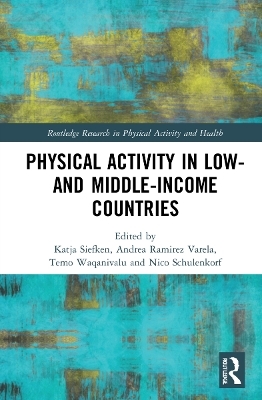
Physical Activity in Low- and Middle-Income Countries
Routledge (Verlag)
978-1-032-11484-2 (ISBN)
This book critically evaluates the complex relations between physical activity, health imperatives and cultural and social opportunities in low- and middle-income countries (LMICs).
The book explores the uncertainty of knowledge around physical activity behavior and its distinctive meanings in LMIC contexts, the factors influencing physical activity, and how populations across the world understand and live the concept of physical activity. It discusses the key challenges and opportunities for sustaining physical activity within geographically and culturally diverse contexts of LMICs; introduces the reader to contemporary global physical activity approaches, models and policies; and presents case studies from around the world, including Asia, Africa, South America, the Pacific and Europe. Overall, the text relates theory to practical examples to facilitate a better understanding of physical activity in context, emphasizes the need for targeted, context-specific and locally relevant interventions to create PA-enabling environments in LMICs, and highlights the role of a range of stakeholders, including policy makers and urban planners, sport and recreation services, mass media, educators and the civil society in shaping population physical activity levels. Taken together, this edited volume brings together the latest research on PA in LMICs from around the world, informs and directs future research and necessary policy change towards the sustainable integration of PA opportunities, and seeks to ultimately foster and promote population-based PA in LMIC settings.
By presenting empirical data and policy recommendations, this text will appeal to scholars, researchers and practitioners with an interest in physical activity research, public health, health promotion, sociology of sport, and sports sciences in LMICs, as well as policy makers and experts working in health promotion, public health, sports and fitness, but also in the urban planning and infrastructure and governmental industries.
Katja Siefken is a professor for physical activity and health at the Medical School Hamburg, Germany. Her research focuses on the prevention of non-communicable diseases through physical activity and sport/health for development interventions with a specific focus on low- and middle- income countries. Andrea Ramírez Varela is an assistant professor at the Faculty of Medicine at Los Andes University. Since 2014, she has been the coordinator of the Global Observatory for Physical Activity and a board member since 2020. She is the secretary of the newly formed Latin American Society for Physical Activity and Health Research and a board member of the International Society for Physical Activity and Health. Temo Waqanivalu is a program officer in the Surveillance and Population-Based Prevention unit of the Prevention of Non-Communicable Diseases (NCD) at the World Health Organization (WHO) in Geneva, Switzerland Nico Schulenkorf is an associate professor of sport management at the University of Technology Sydney, Australia. His research focuses on the social, cultural, and health-related outcomes of sport and event projects in disadvantaged communities.
1. Moving Forward, Moving More: Putting Low- and Middle-Income Countries Firmly on the Global Physical Activity Agenda 2. Global Physical Activity: International Perspectives with Emphasis on Low- and Middle-Income Countries 3. Physical Activity: Challenges and Opportunities in Low- and Middle-Income Countries 4. Physical Activity Policy Actions: What is the Role of Governments? 5. Active Societies: The Global Action Plan on Physical Activity in Low- and Middle-Income Countries 6. Physical Activity Surveillance in the Context of Low- and Middle-Income Countries 7. Foreign Aid, the Soft Power of Sport, and the Sustainable Development Goals: An Analysis of Australia’s Sport for Development in the Pacific Program 8. Progress and Opportunities for Advancing Physical Activity Behavior Change in LMICs 9. Case Study from Latin America: Understanding the Relationship Between the Built Environment and Physical Activity in Latin American Contexts 10. Case Study from Africa: Physical Activity and Safety From Crime and Traffic 11. Case Study from the South Pacific: Women’s Sport Participation in Fiji: Through a Lens of Structural Inequality 12. Case Study from Central America: Challenges and Opportunities for Physically Active Lifestyles in Girls and Young Women in Costa Rica and Countries in Central America 13. Case Study from Asia: Push for pedal power: Urban mobility and rise of bicycling in Indian cities 14. Case Study from Asia: Active Transportation: The Missing Part of the Puzzle for Physical Activity Promotion in India 15. Case Study from Eastern Europe: Physical Activity in the Czech Republic – a Society in Transformation 16. Moving the Agenda Forward: Reflections and Future Outlook on Physical Activity in Low- and Middle-Income Countries
| Erscheinungsdatum | 05.10.2021 |
|---|---|
| Reihe/Serie | Routledge Research in Physical Activity and Health |
| Zusatzinfo | 13 Tables, black and white; 10 Line drawings, black and white; 10 Illustrations, black and white |
| Verlagsort | London |
| Sprache | englisch |
| Maße | 156 x 234 mm |
| Gewicht | 464 g |
| Themenwelt | Sachbuch/Ratgeber ► Gesundheit / Leben / Psychologie |
| Medizin / Pharmazie ► Gesundheitswesen | |
| Naturwissenschaften ► Geowissenschaften ► Geografie / Kartografie | |
| Sozialwissenschaften ► Soziologie ► Spezielle Soziologien | |
| ISBN-10 | 1-032-11484-3 / 1032114843 |
| ISBN-13 | 978-1-032-11484-2 / 9781032114842 |
| Zustand | Neuware |
| Informationen gemäß Produktsicherheitsverordnung (GPSR) | |
| Haben Sie eine Frage zum Produkt? |
aus dem Bereich


